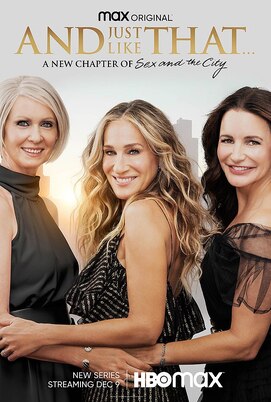|
"So why is the show so often portrayed as a set of empty, static cartoons, an embarrassment to womankind? It’s a classic misunderstanding, I think, stemming from an unexamined hierarchy: the assumption that anything stylized (or formulaic, or pleasurable, or funny, or feminine, or explicit about sex rather than about violence, or made collaboratively) must be inferior." -Emily Nussbaum, The New Yorker, July 2013 NYC. I rarely post about television shows, but Sex and the City (SATC) has come to hold a special spot for me over the years; Cynthia Nixon and SJP are theater ladies (not to mention the wonderful actresses, Karen Pittman and Sarita Choudhury); and the franchise is genius and popular - like it, or not. I used to join the (mostly) anxious men, and mock the adulation of (mostly) women for this show. I've changed my tune. SATC is a very very multilayered nugget, both in form and content, and in the way the series mutates. It continues to be unlike anything else out there; it's cosmetically slippery and emotionally barbed. It indulges in its extravagant, "capitalistic," shallow, immature gumdrops as much as it indulges in its awkward, dark, clumsy and discomfiting edges. Carrie Bradshaw was and is HBO's first major anti-hero: woman or man (and, according to Nussbaum, television's first female anti-hero, period). SATC started HBO. And Parker embodies Bradshaw (then and now) with a kind of simultaneous superficiality and complexity we still rarely see in leading women. Still. Bradshaw is effervescent, frustratingly narcissistic, and randomly possesses distractingly beautiful pearls of insight. Critics talk of the "awfulness" and "self-centeredness" of Carrie Bradshaw frequently, not understanding that, in a way, this is the point. This is a hyper stylized, hyperbolic New York universe (interplaying with an array of genres) about the single lady, juxtaposed against female friendships. Her singleness is the center; not even her work is primarily defining. The world is meant to revolve around Bradshaw and her angst in her city, and make us uncomfortable when it does - making us unable to help but wonder about what paradigm we're in when traditional partnerships are tripped up and women are (matrimonially) alone, and reliant on the backdrop of a sisterhood. Also, speaking of character flaws, I just feel the need to point out that, ya know, though her personality may grate on you, she never, in fact, kills anyone (unlike many of her HBO male counterparts). And Just Like That... seems to be throwing side-eye right back at the current critics, taking advantage of nostalgia; presumptions about and tensions around (female) aging; the present climate surrounding racial dynamics; jitters around fantasy and indulgent, glittery fashion; and the MASSIVE market of the woman's gaze. It's all uneven, righteous/deplorable, deceptively clever, gay, subversive entertainment. It's untidy, unapologetic and apologetic, and a little electric. It seems to be trying too hard and not giving a damn in the same stroke, which is the dichotomy that has always made these characters and their storylines so revolutionary. It's much, much smarter than you think it is (maybe than it thinks it is). I am excited to see where they take this new iteration, and I am venturing to guess haters and lovers —alike—are, too. It's gonna be a hit.  ShareAlike 4.0 International (CC BY-SA 4.0). ShareAlike 4.0 International (CC BY-SA 4.0). "And I can’t help but wonder: What would the show look like without that finale? What if it were the story of a woman who lost herself in her thirties, who was changed by a poisonous, powerful love affair, and who emerged, finally, surrounded by her friends? Who would Carrie be then? It’s an interesting question, one that shouldn’t erase the show’s powerful legacy. We’ll just have to wait for another show to answer it." -Emily Nussbaum, The New Yorker, July 2013 Comments are closed.
|

